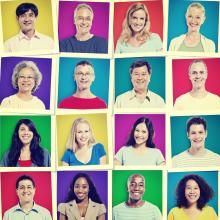changing demographics
The center of Christianity has dramatically shifted, and that means the agenda was very different from the northern and western agendas of the older white evangelicals in America and the issues they think most important. Korea could play a particular and convening role as a bridge between the churches of the global north and south.
In sharp and grateful contrast to the old ideologies of global North evangelicals, these global South evangelicals spent their time together wrestling with issues of global economic inequality, the realities of climate change, the imperatives of racial justice, and the need for Christians to wage peace instead of war. Since these are the issues that global evangelical and Pentecostal constituencies are facing in their own lives — and of course, the Bible addresses all of them as the central issues Christians need to confront today — the narrow, white American evangelical agenda had no interest in this global evangelical and Pentecostal forum. The fact is that they represent a different evangelical world.
The Edmund Pettus Bridge was named after a Confederate general who became a Grand Dragon in the Ku Klux Klan. His name, still emblazoned over the top of that now famous bridge, was a powerful and threatening symbol of white power and supremacy in Selma, Ala. The Student Non-Violent Coordinating Committee (SNCC) had at one time removed Selma from their list of places to organize because “the white folks were too mean, and black folks were too afraid."
But that didn’t deter a group of courageous African Americans from marching across that bridge a half-century ago, risking their lives for the right to vote in America. They were attacked and beaten by the fierce forces, led by notorious Sheriff Jim Clark, for their resistance to the frightening violence of white power.
Last Saturday, during the 50th anniversary event of “Bloody Sunday,” I spent many hours just looking at that bridge. The words that kept coming to me were “courage” and “resistance.” My question became: what bridge we will now have to cross?
Congressman John Lewis, whose skull was cracked that day as a young man, opened the main event.
"On that day, 600 people marched into history … We were beaten, tear gassed, some of us [were] left bloody right here on this bridge. … But we never became bitter or hostile. We kept believing that the truth we stood for would have the final say.”
Then Lewis introduced the president, "If someone had told me, when we were crossing this bridge, that one day I would be back here introducing the first African-American president, I would have said you're crazy.”
What happened on this bridge, President Barack Obama said, “was a contest to determine the meaning of America,” and where “the idea of a just America, a fair America, an inclusive America, a generous America … ultimately triumphed.”
The 6.5 million people in the greater Houston area now surpass New York City and Los Angeles as the most racially and ethnically diverse urban area in the U.S. That's the site where a broad spectrum of U.S. church leaders met this week to consider the impact of immigration on their congregations, and on the rapidly changing expressions of Christianity within North American culture.
The group gathered at the annual convocation of Christian Churches Together in the USA, which includes the leadership of the U.S. Catholic Conference of Bishops, several Pentecostal and evangelical denominations, the Orthodox Churches, some Historic Black churches, and nearly all the major historic Protestant denominations. All of these are experiencing the impact of immigration. Most dramatically, for instance, 54 percent of millennials — those born after 1982 — who are Catholic are Latinos. Of the 44 million people living in the United States who were born in another country, 74 percent are Christian, while only 5 percent are Muslim, 4 percent Buddhist, and 3 percent Hindu.
While church leaders in the U.S. have expressed united support for the reform of U.S. immigration laws, this is the first time an ecumenical body has gathered to examine together the actual consequences of immigration on the life and witness of its churches.
A global leader in ecumenical movement has alerted participants to the forthcoming World Council of Churches 10th Assembly in Busan, to be aware that they meet in rapidly changing times for world Christianity.
He says there are consequences for all church institutions, including the WCC itself.
Rev. Wesley Granberg-Michaelson, in a book timed to coincide with the gathering, says so fundamental are the changes now shaping the Christian world that the WCC will need to "commit to deep change."
It they don't, he says, they could remain largely isolated from the dynamic and growing parts of the church, especially from the global South.
His perceptions are likely to strike a chord at when the World Council of Churches meets in Busan from Oct.30 to Nov. 8 for its 10th Assembly, the highest decision making body of the grouping that represents some 560 million Christians.
Granberg-Michaelson, is a former member of the main governing body of the WCC, its central committee, and worked on the staff of the organization for six years, originally as director of the Church and Society programme.
He says the book, From Times Square to Timbuktu, is an attempt to describe the "growing gulf" occurring in world Christianity, primarily between the burgeoning Pentecostal and evangelical churches in the global South and the declining churches of the global North.



